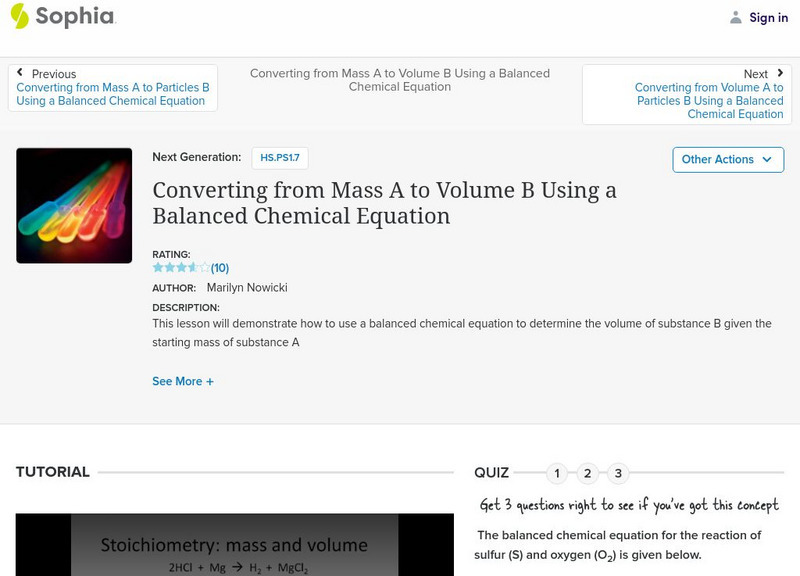Crash Course
Equilibrium Equations: Crash Course Chemistry
In which Hank shows you that, while it may seem like the Universe is messing with us, equilibrium isn't a cosmic trick. Here, he shows you how to calculate equilibrium constant & conditions of reactions and use RICE tables all with some...
Bozeman Science
Physical and Chemical Changes
Mr. Andersen explains the difference between physical and chemical changes. A brief discussion of chemical reactions and equations is also included.
Bozeman Science
A Beginner's Guide to Balancing Equations
Mr. Andersen explains the basics of balancing chemical equations. A visual guide shows you how to change coefficients to balance the atoms in reactants and products.
Curated Video
Striking a Balance : Investigating Reaction Rate and Stoichiometry
Influence of Stoichiometry on Rate of Reaction. Rate of Reaction & Stoichiometry part 1
Curated Video
Learning the Mechanisms : Investigating the Breakdown of Ammonia and Reaction Rates
Stoichiometry role in rate formation of Nitric oxide formation. Rate of Reaction & Stoichiometry part 2
Curated Video
GCSE Chemistry - Alkanes: properties & combustion #52
In this video, you'll learn: - The properties of alkanes, and the specific trends you can observe as the length of carbon chain increases - The equation for the combustion of alkanes - How to write balanced equations for the combustion...
Curated Video
GCSE Chemistry - Cracking Crude Oil & Alkenes #54
In this video you'll learn: - Two methods of cracking - How to write a balanced equation for cracking - What an alkene is, and how they differ from an alkane - The test for alkenes - The properties of alkenes
Curated Video
Combustion of Fuels and Balancing Chemical Equations
This video provides an overview of the combustion of fuels, including what fuels are and their various uses, the differences between complete and incomplete combustion, and how to balance an equation for the combustion of a particular...
Professor Dave Explains
Practice Problem: Calculations Involving pH and Ka
We know a bit about acids and bases, including the definitions of pH and pKa, as they relate to an acid-base equilibrium. If we have a weak acid and its concentration, as well as the pH of the solution, can we calculate the Ka for the...
Professor Dave Explains
IIT/JEE Chemistry Practice #2: Molar Mass/Stoichiometry
Practice REAL problems from actual past IIT/JEE exams with Professor Dave!
msvgo
Stoichiometry
It explains the concept of Stoichiometry, Concentration of Solution, Mole Fraction, Molality & Molarity.
Khan Academy
Khan Academy: Chemistry: Introduction to Stoichiometry
Work through balancing equations with this video module. As equations are worked suggestions and steps are given to help students develop techniques to balance chemical equations. [14:28]
Khan Academy
Khan Academy: Chemistry: Introduction to Stoichiometry
A video lecture giving examples of how to complete stoichiometry problems. The video shows how to calculate the number of grams of each reactant needed to complete the reaction. Also shown is how to determine the limiting reactant in the...
Khan Academy
Khan Academy: Chemistry: Stoichiometry Example Problem 2
A video lecture showing step-by-step how to solve a stoichiometry problem. The problem gives you a given number of grams of a molecule, and ask you to solve for how much of another molecule would be to required to completely react with...
Sophia Learning
Sophia: Chemical Equation: Definition
Find out how to write a balanced chemical equation in this narrated tutorial. [4:57]
Next Vista for Learning
Next Vista for Learning: Balancing Chemical Equations
A video giving step-by-step instructions on how to balance chemical equations. [1:35]
Sophia Learning
Sophia: Converting From Mass a to Volume B Using a Balanced Chemical Equation
This lesson will demonstrate how to use a balanced chemical equation to determine the volume of substance B given the starting mass of substance A.
Sophia Learning
Sophia: Converting From Volume a to Particles B Using a Balanced Equation
This lesson will demonstrate how to use a balanced chemical equation to determine the number of particles of substance B given the starting volume of substance A.







